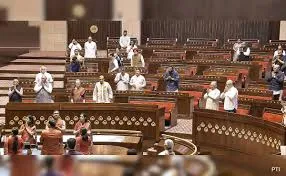After the passage of the Waqf Amendment Bill in Parliament, it is time for full on politics by Opposition parties that had prepared the ground for it by painting the bill as anti-Muslim and communal. Ahead of the Bihar Assembly elections, to be held sometime later this year, a competition of sorts has broken out among parties to prove to their Muslim voters that they are their biggest saviours. Since this cannot be done without painting the ruling coalition as the villain of the piece, Muslims are being told that the Amendment Bill has been designed to snatch away their property and make them second class citizens of the country. When the truth is that the Bill is actually about the management and governance of Waqf property, by making the functioning of the Waqf boards more efficient and transparent, apart from making the boards more representative.
While Waqf is assets donated for charitable purposes, with the owner being God once the property is transferred as Waqf, the management of that property by the Waqf boards has come in for severe criticism even by Muslims for being riddled with corruption. Proceeds from such property are to be used for the welfare of the Muslim community and Waqf property cannot be sold. This has not stopped Waqf boards from allowing such land for different purposes in exchange for a hefty sum of money, which, more often than not, has not been used for the betterment of the Muslim community. As Home Minister Amit Shah pointed out in Parliament, “The leased Waqf Board properties were 20,000, but in 2025, as per records which might be wrong, these properties became zero. Where did these properties go? With whose permission were they sold?” As per government data, the country’s 32 Waqf boards are the third highest owner of land after India’s armed forces and the railways. The Waqf boards have enjoyed untramelled powers to claim any property as Waqf, including government or private property. Waqf boards used Section 40 of the earlier Waqf Act to declare any land as Waqf property—decisions that were considered final. For example, two islands in Bet Dwarka, the place where Hindus believe Lord Krishna ruled, was claimed as Waqf property. The municipal building in Surat was declared as Waqf property because of its debatable connection with some Muslims in the past. Entire villages in the South have been declared as Waqf property, as well as the national heritage monument, the Taj Mahal and a 1,500-year-old Chola temple. During the Maha Kumbh Mela 2025 at Prayagraj there was news that the mela ground had been claimed as Waqf property. As Home Minister Amit Shah pointed out in Parliament, between 1913 and 2013, 18 lakh acres of land were claimed as Waqf property, while in just the last 12 years, 21 lakh acres were added to that list. This was primarily because the Waqf boards were given a free hand by the then UPA government through an amendment to the Waqf Act. Essentially, a handful of individuals, by dint of belonging to the Waqf Boards were supposed to be in control of 39 lakh acres of land in the country—a case of a gigantic land grab
Hence, amending the Waqf Act to get rid of its draconian provisions and making it more representative and women friendly was the need of the hour and that is what was done. For this, support has come even from Muslims—for instance the All India Muslim Women Personal Law Board—because they too have suffered in several cases of maladministration by the Waqf boards. The problem now is in seeing discrimination towards Muslims where there is none. But then this directly feeds the narrative of “Muslims in danger” in India, and that is what the Opposition has latched on to, with ample help from bodies like the All India Muslim Personal Law Board. Their strategy is about allowing a handful of individuals from this particular community complete control over vast resources, but without any accountability in the hope that they being community leaders will transfer Muslim votes en bloc to the respective political parties. And now there is the worry that this anti Waqf bill movement will be stoked into much bigger protests, the way it was done with the Citizenship Amendment Act, as a result of which an Act that had nothing to do with Indian Muslims, was painted as an instrument to disenfranchise them. The Indian government’s name was made mud internationally in the process. And thus a good reform was almost killed. This Waqf issue is likely to get bigger ahead of the Bihar elections, in the hope that whatever Muslim support Nitish Kumar’s JDU enjoys, melts away. The eventual aim is to drive a wedge among the constituents of the ruling NDA coalition at the Centre and thus destabilise it. Hence, the need of the hour is to increase the channels of communication between the ruling BJP and the Muslim community, so that the latter do not fall for the canards that are being spread about this amendment Bill. Without communication, a good law will be forever tainted in the minds of India’s largest minority community.























